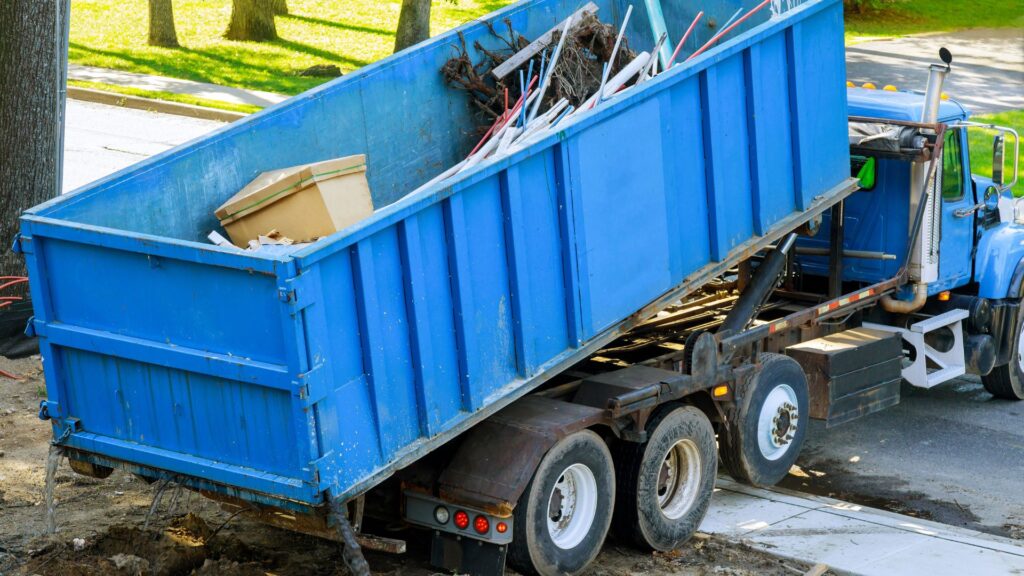When tackling a construction project in Riverside, one of the most overlooked but crucial decisions is choosing the right dumpster. From home remodeling to large-scale building work, construction projects often generate far more waste than homeowners or contractors expect. Without a well-thought-out disposal plan, the entire project can be slowed down by debris piling up and cluttering the job site. The right dumpster ensures that every piece of unwanted material—from drywall scraps to heavy concrete—has a designated place, keeping your workspace safe and efficient. Yet, selecting the perfect dumpster isn’t always straightforward. Factors like the type of debris, the scale of the project, and local disposal requirements all play an important role.
Understanding Dumpster Sizes for Construction Projects
Construction debris doesn’t fit into a one-size-fits-all solution, which is why choosing the correct dumpster size is vital for Riverside projects. Smaller renovations, such as bathroom or kitchen upgrades, may only need a modest container, while larger ventures like full-home remodeling or commercial construction call for bigger dumpsters capable of handling heavy loads. Oversized dumpsters might sound convenient, but they can create unnecessary space that goes unused, while undersized containers can force multiple rentals, slowing down progress.

It’s not just about cubic yards; it’s about matching the container’s capacity with the type and volume of materials expected. In Riverside, construction teams often deal with mixed debris—wood, metal, drywall, and sometimes concrete. Each type of waste has a different density, which affects how quickly a dumpster fills up. By aligning the dumpster size with project scope, homeowners and contractors can avoid frustrating mid-project swaps, ensuring waste management keeps pace with the work.
Matching Dumpster Type With Construction Debris
Every construction project generates unique waste, and Riverside contractors know that not all dumpsters are created equal. A roofing job, for example, produces dense, heavy shingles that demand containers built for weight, while a demolition produces bulky but lighter materials. Choosing the right dumpster means considering the nature of debris, not just its volume. Concrete, asphalt, and dirt require sturdier dumpsters that can bear heavier loads without causing strain during transport.
On the other hand, mixed debris from remodeling projects benefits from roll-off dumpsters designed for versatility. Using the wrong type not only risks overloading but can also complicate disposal compliance in Riverside. Local regulations often dictate how different materials should be discarded, and certain dumpsters are better suited for recycling or separating waste streams. Understanding this connection between debris type and container choice helps keep the project compliant, efficient, and environmentally responsible while preventing delays caused by improper disposal.
Why Location Accessibility Matters When Choosing a Dumpster
Dumpster placement is more than a convenience—it directly affects how smoothly a Riverside construction project unfolds. Narrow driveways, tight alleyways, or limited street access can all create obstacles for delivery and pickup. A poorly placed dumpster may block entryways or force workers to carry debris long distances, wasting valuable time and energy. Choosing the right size and type involves considering where it will sit on the property and how easily haulers can reach it.
In Riverside, where residential and commercial areas vary in layout, accessibility must be planned ahead. Roll-off dumpsters are often delivered by trucks that require space to maneuver, so measuring clearance and anticipating obstacles like power lines or low tree branches can prevent headaches. A strategically placed dumpster near the work zone not only boosts efficiency but also improves safety, reducing unnecessary trips across uneven or hazardous terrain. Planning accessibility makes waste removal seamless throughout the project’s timeline.
Considering Local Regulations for Construction Waste
Construction waste disposal in Riverside comes with specific rules that cannot be ignored. Local guidelines dictate what materials can go into a dumpster and how certain items must be handled. Hazardous substances such as paint, solvents, and chemicals often require special arrangements, and mixing them with general debris can lead to fines. Choosing the right dumpster means being aware of these regulations from the start, avoiding costly mistakes.
Many construction projects involve materials that can be recycled, such as metals or concrete. Riverside authorities encourage proper sorting to reduce landfill impact, and some dumpster types are specifically designed to support recycling efforts. When contractors or homeowners fail to account for local waste management requirements, projects can experience delays or added costs. By factoring in regulations during dumpster selection, Riverside residents can streamline disposal while staying compliant, ensuring construction projects finish without unnecessary legal or logistical complications.
Balancing Project Timeline With Dumpster Rental Period
Time plays a critical role in construction projects, and waste management must align with deadlines. In Riverside, dumpster rentals are typically scheduled for specific periods, but construction projects often face unexpected delays. Choosing the right dumpster involves considering not only size but also how long it will be needed on-site. An undersized rental period can leave contractors scrambling, while an overly long rental might result in unused time and extra expense.
Project phases also influence timing. For example, demolition generates large amounts of waste in the early days, while finishing work creates smaller debris toward the end. Selecting a dumpster rental period that matches these cycles ensures the container is available exactly when it’s needed most. By planning around the project’s pace, Riverside construction crews can maintain a steady workflow, keeping debris contained and schedules on track without interruptions caused by premature removal or late arrivals.
Avoiding Overloading Issues With the Right Dumpster Choice
One of the most common mistakes in Riverside construction projects is overloading dumpsters. When a container is too small or not built for the type of debris, it quickly exceeds weight limits. This can result in extra fees, safety hazards, and complications during pickup. Selecting the correct dumpster is essential to prevent these setbacks. Heavier debris like concrete, soil, or roofing materials can fill a container halfway yet still reach the weight limit.
By matching dumpster specifications with debris type, contractors avoid the frustration of dealing with overloaded containers. Roll-off dumpsters designed for heavy waste offer sturdier builds and higher weight allowances, making them ideal for demanding jobs. Additionally, understanding local regulations about maximum weight and disposal practices helps Riverside residents make smarter choices. Overloading not only disrupts efficiency but also jeopardizes safety for workers and haulers, making dumpster selection a cornerstone of responsible project planning.
How Dumpster Size Impacts Safety on the Job Site
Safety is a top priority for any construction project in Riverside, and waste management plays a surprisingly large role in maintaining it. An undersized dumpster can cause debris to pile up around the site, creating trip hazards and making it difficult for workers to maneuver. On the other hand, an oversized container placed in the wrong spot can block access routes or emergency exits, putting crews at risk.
Choosing the right size means balancing waste volume with site layout and workflow. A properly sized dumpster ensures debris is immediately contained, keeping walkways clear and work zones safer. In Riverside’s fast-moving construction environments, minimizing clutter and hazards not only reduces the chance of accidents but also enhances overall productivity. A safe, organized job site starts with thoughtful planning, and selecting the correct dumpster size is one of the simplest yet most effective steps to achieve it.
The Environmental Impact of Dumpster Selection
Choosing the correct dumpster doesn’t just benefit the project—it also impacts Riverside’s environment. The wrong choice can lead to inefficient waste handling, with recyclable materials ending up in landfills. By selecting containers designed for sorting or recycling, construction crews can divert significant amounts of debris away from unnecessary disposal. This helps reduce the project’s ecological footprint while aligning with community sustainability goals.
Certain dumpster types are built to accommodate specific waste streams, such as concrete, metal, or wood. Using them correctly ensures materials are processed in eco-friendly ways. Riverside places increasing importance on sustainable construction practices, and waste management is a central part of this responsibility. Making informed dumpster choices allows contractors and homeowners to contribute to cleaner surroundings without adding effort. Waste removal becomes not only a logistical decision but also an environmental one, underscoring the importance of careful planning.
Choosing a Dumpster Based on Project Scale
Every Riverside construction project varies in size, and the dumpster must match that scale. A small residential renovation may only produce a few cubic yards of waste, making a compact container the practical choice. In contrast, large-scale demolitions or commercial builds generate enormous amounts of debris that demand substantial roll-off dumpsters capable of handling heavy and bulky materials without frequent swaps.
The scale also dictates how many dumpsters may be required. Multiple smaller containers might be more efficient for large sites with different types of debris, allowing teams to separate waste for easier disposal. Riverside projects that underestimate scale often face repeated pickups, slowing down progress. By realistically evaluating the project’s scope, contractors and homeowners can select a dumpster strategy that keeps work flowing smoothly, reduces downtime, and ensures waste is consistently managed in proportion to the project’s true size.
Conclusion
Selecting the right dumpster for a construction project in Riverside may seem like a minor detail, but it directly affects efficiency, safety, and compliance. The right choice ensures debris is managed responsibly, timelines stay on track, and projects avoid unnecessary interruptions. From considering debris type and weight to understanding accessibility and local regulations, each decision contributes to smoother project execution. Homeowners and contractors who carefully evaluate dumpster needs before starting work enjoy a more organized and stress-free building process.
For dependable and efficient dumpster rental services in Riverside, turn to Haul Brothers Dumpster Rental. With a focus on reliability and convenience, they make waste management simple for any size project. Contact them today at (949) 600-0878 to secure the right dumpster for your next construction job and keep your project moving forward without delay.

